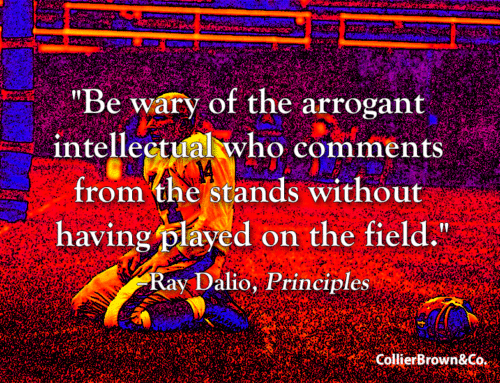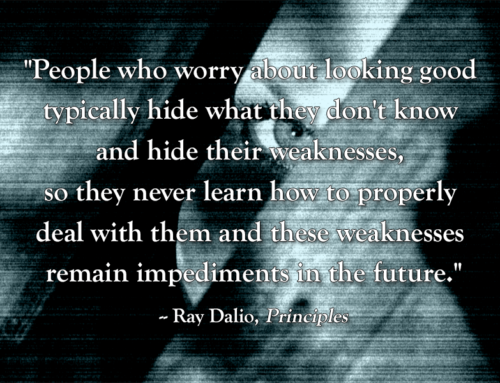Perhaps it’s the season – election season – that’s generating more frequent discussions from my clients and others about how politics fits, or doesn’t fit, into the context of leadership, and vice-versa. My initial reaction to these discussions begins with the Forrest Gump-like assertion that leadership is as leadership does.
Before we go any further, note that it’s possible for the language to get in the way here. “Leadership” can mean many things: a position (“She’s been promoted to leadership.”), a set of characteristics or traits (“He demonstrated the traits of leadership at an early age.”), a set of skills that can be learned (“The management team has significantly improved their leadership skills during the past year.”), a style (“Our CEO has a collaborative style of leadership.”), a response to different people situations (“We tend to see more delegation with the experienced managers and more coaching with those who are still developing.”), or a motivation methodology (“Our team leader is terrific at combining support and challenge to get the best performance from our group.”). I could go on, but you get the idea.
For our purposes leadership means “those who lead.” A fundamental and functional description of “those who lead” says leadership is about building willing followership for a cause, idea or course of action.
So, are politicians leaders? Generally, no. They may fit the fundamental description of building willing followership during the campaigns, but that actually may be the more important point about politicians as leaders: campaigns. I appreciate what Stephen Denning points out in The Secret Language of Leadership, that today’s politicians are characterized by the acquisition and retention of political office more than anything else. That’s rather different from appealing to people’s higher moral aspirations and values and inspiring (leading?) them to take on the challenge of long-lasting change. Politicians who don’t focus tightly on getting and keeping office either don’t make it or don’t last long.
In the world of politicians, success is defined by getting elected and then reelected. The principles involved are similar to those defined by Machiavelli some 500 years ago.
- Willing to fight – one must have the stomach to fight the established order and be ruthless in the pursuit of power. This principle alone often discourages the best people from running for high office.
- Well armed – one is well armed today if they are well funded. Financial resources provide the power required to execute a robust campaign.
- Play hard ball – one has to play perilously close to the edge of legality and, whenever necessary, bend the law to suit their own advantage, purposes or needs.
- Flexible – one has to be chameleon -like to make unplanned adjustments to unpredictable shits in a situation.
- Image of being honest, compassionate, moral and devout – even though it’s necessary to play hardball (such as engaging in character assassination of an opponent), one has to keep a favorable public image. Frequently underlings or minions are dispatched to do the dirty work of winning an election.
- Issues for which there is already a consensus in the electorate – one finds out quickly that persuading people to raise their moral sights and do something completely different is hard and risky work for a politician. Most tend to avoid such heavy lifting and pursue only those issues already ripened by the electorate.
- Ambiguous – one’s candidacy for change is typically defined as something like “get this country back to work;” a notion so general that is hard to know what they actually promised.
Politicians are faced with a myriad of issues. The narrow focus of a leader trying to bring about purposeful change runs counter to their reality. The sheer breadth of the issues that beset them makes the transformational aspect of leadership difficult, perhaps impossible, to achieve. Leadership involves choosing or committing to making change happen and successful change agents may not get personal recognition for making the change happen; they may even be punished for the success. And what if it fails? The cost could be even higher. These points, too, are counter to a politician’s reality of the primacy of getting elected and then reelected.
All this is not to say that politicians are useless or invaluable. As Denning says, “politicians who are not leaders can perform a useful social function by holding the body politic together. Successful politicians contribute by setting boundaries and establishing values, norms, and regulations. They build on the status quo and hold the space win which many different types of energy can flourish – those who pursue change as well as those who defend the existing values… These qualities are not to be sneezed at, even though they are not necessarily the qualities of a transformational leader.”
Politicians may not be leaders in the sense of “those who lead.” However, they do make a difference, for better or for worse
Next post: The Politics of Leadership, or how those who lead need and utilize the best of politics to make a difference.
In Other Words…
“There is nothing more difficult to take in hand, more perilous to conduct, or more uncertain in its success, than to take the lead in the introduction of a new order of things. For the reformer has enemies in all those who profit by the old order, and only lukewarm defenders in all those who would profit by the new order, this lukewarmness arising partly from fear of their adversaries … and partly from the incredulity of mankind, who do not truly believe in anything new until they have had actual experience of it.” –Niccolo Machiavelli
“The dirty little secret – the fact often denied – is that unlike the mythical epiphany, real creation is sloppy. Discovery is messy; exploration is dangerous. No one knows what he’s going to get when he is being creative.” -Scott Berkun, The Myths of Innovation
“We are so accustomed to disguise ourselves to others, that in the end, we become disguised to ourselves.” – Francois de la Roche Foucald
“True terror is to wake up one morning and discover that your high school class is running the country.” – Kurt Vonnegut
“Go not to the elves for counsel, for they will say both yes and no.” – J.R.R. Tolkien
“Ideologies separate us. Dreams and anguish bring us together.” – Eugene Ionesco
“We stand today on the edge of a new frontier — the frontier of the 1960s, a frontier of unknown opportunities and perils, a frontier of unfulfilled hopes and threats. The new frontier of which I speak is not a set of promises – it is a set of challenges.” – John F. Kennedy
In The Word…
Kings take pleasure in honest lips; they value a man who speaks the truth. -Proverbs 16:13






